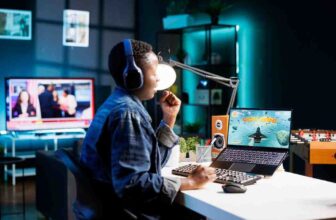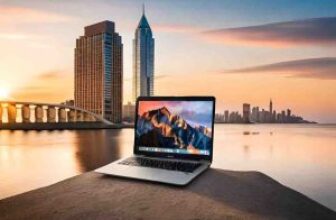[ad_1]
Microsoft’s latest top-end laptop sticks with its novel screen-flipping form, with upgrades on the inside aimed at keeping up with the powerhouse competition – but these improvements come with a very steep price increase.
The Surface Laptop Studio 2 starts at £2,069 (€2,239/$1999.99/A$3,343) – a £620 increase over the outgoing model. That takes it far away from the normal premium consumer range on which Microsoft has built its Surface reputation, and places it firmly in the creative workstation class of machine typically used by programmers and video and photo editors.
It may have “laptop” in the name, but the Laptop Studio 2 is a bit of a beast, weighing almost 2kg in its top spec – heavier, slightly thicker and made of aluminium rather than the magnesium of its predecessor.
The rest of the machine is very similar to the 2021-22 model. The good-looking 14.4in LCD screen is hinged in the middle, allowing it to pull forward to switch between stage, drawing and laptop modes. With the excellent Slim Pen 2 stylus (£120), this flexibility is the machine’s big draw. An additional USB-A port and microSD card slot in the side are appreciated, but the lack of a full-sized SD card slot is a miss in a machine of this size.
The webcam with Windows Hello face recognition, mics and speakers are great, as are the keyboard and trackpad, even if the front lip of the machine is quite high because of the base’s thickness.
Specifications
-
Screen: 14.4in LCD 2,400×1,600 (201 PPI; 120Hz)
-
Processor: Intel Core i7-13700H (13th generation)
-
Ram: 16, 32 or 64GB
-
Storage: 512GB or 1TB
-
Graphics: Intel Iris Xe, Nvidia GeForce RTX 4050 6GB, RTX 4060 8GB or RTX 2000 8GB
-
Operating system: Windows 11
-
Camera: 1080P front-facing, Windows Hello
-
Connectivity: wifi 6E, Bluetooth 5.3, 2x Thunderbolt 4/USB 4, USB-A, microSD, headphones, Surface Connect
-
Dimensions: 323 x 230 x 22mm
-
Weight: 1,890 or 1,980g
13th-gen Intel and Nvidia RTX 40 series upgrades
The biggest changes are on the inside of the machine. Microsoft has ditched the choice of Intel processors and is now sticking solely with the 13th-gen Core i7 H-series chip, as seen in the excellent Samsung Galaxy Book 3 Ultra.
It is a powerful laptop chip, but it is to be replaced very soon in Intel’s lineup. The company announced a dramatic shift in design, and potentially performance, with 14th-generation “Core Ultra” processors in September. The timing is unfortunate for Microsoft, particularly with a machine of this standard.
There are a choice of graphics options. The starting machine ships with Intel’s low power integrated graphics, with upgrades to Nvidia low-end GeForce RTX 4050 or 4060 costing more, and topping out with an RTX 2000, which is designed for modelling and similar activities rather than video games or editing.
The combination of Intel and Nvidia chips is pretty powerful. When the laptop is switched to its high-performance mode, it will even handle some high-end gaming with the right graphics settings. But the Laptop Studio 2 comes up a little short on raw power compared with the competition, including the Galaxy Book 3 Ultra, Dell’s latest XPS 15, and Apple’s M3 Max MacBook Pro.
One area where the Laptop Studio 2 is decidedly behind its predecessor and key rivals is battery life. The machine lasted only around seven hours of light office work – two hours short of last year’s model, and about half what you would get out of a top-spec 14in MacBook Pro. When pushed with photo and video editing, the figure drops, which means it will be fine for short bursts of creative work on the go, but you will need to bring the charger.
Windows 11 with Copilot
The Windows 11 experience on the Surface is second to none, running smoothly and easily. The look and feel of Windows has been modernised in the last few years, including improved stylus and touch experiences that play to the Laptop Studio 2’s strengths.
The big new addition to Windows this year is Microsoft’s AI system, called Copilot, which is a conversational generative AI assistant that pops up in a vertical bar on the right of the screen. You can ask it questions, search the web and carry out other general assistant activities. But it can also generate text and images, which you can then paste straight into an email, message or document. You have to ensure you check the text/images carefully before sending, as it routinely made mistakes, such as generating a PlayStation joypad in an image of someone playing an Xbox, or putting the wrong facts or figures in text.
It is fun to play with as a tech demo, but all of the processing is done remotely on Microsoft’s servers. Responses take a good 10 seconds or so to process, but then you have to wait for it to type it all out, which can take another minute or so, depending on how long the response is. It takes a similarly long time for image generation, and none of it works without an internet connection.
Currently, Copilot can’t open apps on your computer or change settings such as turning off Bluetooth without having to click a button. And because it generally pulls information from the web when you ask it a question, such as “how to turn off the 120Hz screen to save battery”, it will start telling you how to do it on an iPhone, not the Surface. Copilot certainly has potential, but it will require a lot of work to be an essential, reliable tool.
Sustainability
Microsoft does not provide an expected lifespan for the battery, but it should last in excess of 500 full-charge cycles with at least 80% of its original capacity. Battery replacement costs £437.88, and screen repair costs £583.86 out of warranty.
The SSD storage is modular, but Microsoft states that it should only be removed by technicians. The company operates recycling schemes for old machines and publishes a company-wide sustainability report, plus a breakdown of each product’s environmental impact.
Price
The Microsoft Surface Laptop Studio 2 costs from £2,069 (€2,239/$1999.99/A$3,343), with models with Nvidia graphics coding from £2,469 (€2,719/$2,399.99/A$3,989) and costing £3,369 (€3,799/$3,299.99/A$5,156) as reviewed.
For comparison, the Surface Laptop 5 costs £999, the Dell XPS 15 with similar specs costs about £1,500, the Razer Blade 15 costs £2,500, and the Apple M3 Max MacBook Pro costs £3,299.
Verdict
The Surface Laptop Studio 2 is a good machine stuck in an odd place. It is too expensive for a consumer laptop, and no one should buy the entry-level machine for £2,000.
It also struggles when matched up against rivals, particularly on raw power and battery life – two areas that will be very important to the target audience of developers, photographers, videographers and so-called creators.
It has some advantages, including the fold-forward screen, the best stylus support, an excellent set of speakers, a great keyboard and trackpad. But Microsoft’s lead on the basics here is being eroded by Windows rivals or beaten by Apple, so whether that’s enough to justify the cost, I’m not sure.
The Surface Laptop Studio 2 is a lovely machine, but one that isn’t a firm recommendation except for Microsoft fans or those who really need the folding screen.
Pros: good screen with articulating modes, great keyboard and trackpad, Thunderbolt 4/USB 4 and USB-A, microSD card slot, discrete Nvidia graphics card option, Windows Hello.
Cons: very expensive, chunky, heavy, average battery life, down on performance compared with competitors, Slim Pen 2 not included, Copilot needs work.
[ad_2]






